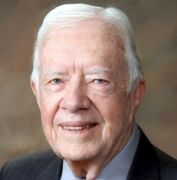- 7 Best Breads for Maintaining Stable Blood Sugar
- Gelatin vs. Collagen: Which is Best for Skin, Nails, and Joints?
- The Long-Term Effects of Daily Turmeric Supplements on Liver Health
- Could Your Grocery Store Meat Be Causing Recurring UTIs?
- Are You Making This Expensive Thermostat Error This Winter?
- Recognizing the Signs of Hypothyroidism
- 10 Strategies to Overcome Insomnia
- Could Artificial Sweeteners Be Aging the Brain Faster?
- Techniques for Soothing Your Nervous System
- Does the Water in Your House Smell Funny? Here’s Why
Jimmy Carter Being Treated for Melanoma That Has Spread to Brain


Displaying the grace and calm that has been a hallmark of much of his public life, former President Jimmy Carter announced Thursday that doctors have found cancer on his brain, and he plans to undergo radiation treatment and targeted therapy.
An MRI scan has revealed four spots of melanoma on Carter’s brain, the 90-year-old Georgia native said during a press conference at The Carter Center in Atlanta.
“They are very small spots, about 2 millimeters, if you can envision what a millimeter is. I get my first radiation treatment for the melanoma in my brain this afternoon,” Carter said. He will undergo four treatments at three-week intervals.
Carter also will receive treatments of pembrolizumab (Keytruda), an intravenous drug that boosts the body’s immune response against melanoma cells. The former president said he’s already been given the drug once, for 30 minutes.
Carter is being treated by doctors at Emory University in Atlanta, and he said he plans to follow all their recommendations. The Emory doctors are receiving advice from other experts at the National Cancer Institute and cancer centers such as Sloan Kettering in New York City and MD Anderson in Houston.
Cancer expert Dr. George Raptis said Carter likely will benefit from recent advances in melanoma treatment that have created targeted drugs like pembrolizumab.
“While this remains an incurable disease, there have been tremendous improvements in treating melanoma with targeted therapies that take advantages of this cancer’s genetic vulnerabilities, and others that harness the body’s immune system to fight this cancer more effectively,” Raptis explained. He is associate chief of hematology/oncology for North Shore University Hospital in Manhasset, N.Y., and Long Island Jewish Medical Center in New Hyde Park, NY.
“In many cases patients may have a significant response to these therapies, and in a smaller subset a prolonged response,” Raptis said.
Surgeons earlier this month removed a melanoma tumor that had been found on Carter’s liver following a May trip to Guyana. They had to remove a tenth of Carter’s liver to fully excise the tumor, he said.
Carter delayed the liver surgery to August so he could complete a 15-city book tour, based on assurances from his doctors that the tumor would grow slowly.
A follow-up MRI taken immediately after the surgery revealed the melanoma spots on Carter’s brain. The original location of his melanoma has not yet been found, Carter said, and he expects that future scans will reveal other places where cancer has spread.
“I would say that night [of his diagnosis] and the next day until I came back up to Emory, I thought I just had a few weeks left, but I was surprisingly at ease,” Carter said of learning about his brain cancer. “I’ve had a wonderful life. I’ve had thousands of friends. I’ve had an exciting, adventurous and gratifying existence, so I was surprisingly at ease. Much more so than my wife was. Now I feel it’s in the hands of God, and I’ll be prepared for anything that comes.”
His treatment likely will interfere with a planned Habitat for Humanity trip to Nepal in November, which Carter said would have been his “33rd year of going without fail.”
“If I do that, I understand from my schedule that would require a five-week postponement of my last treatment, so that’s what I’ll have to consider,” he said, adding that, “If I don’t go, the rest of my family will go to take my place.”
However, Carter said he still plans to teach Sunday School this weekend, as usual.
Carter remained calm and smiled his signature smile during the press conference, and even cracked a couple of jokes.
He said he’s received calls of support from President Barack Obama, Vice President Joe Biden, former Presidents George H.W. Bush, Bill Clinton and George W. Bush, and current Presidential candidate and former Secretary of State Hillary Clinton.
“It’s the first time they’ve called me in a long time,” he said with a smile, prompting laughter from the audience.
Carter has a history of cancer in his family. His brother, father and two sisters all died of pancreatic cancer, and his mother had breast cancer that later moved to her pancreas. “For a long time, my family was the only one on earth that had as many as four people die from pancreatic cancer,” he said during the press conference.
Carter has a large family, with 12 grandchildren and 10 great-grandchildren, and he said all will be encouraged to undergo cancer screening.
“I don’t think there’s any doubt my descendants have some genetic challenge from the pancreatic cancer and my melanoma,” he said.
Carter served as President between 1977 and 1981, and has been very active in humanitarian efforts during his post-presidential life. He annually travels to other countries to build houses for Habitat for Humanity, has overseen democratic elections in third-world countries torn by strife, and through his non-profit Carter Center provides programs to advance peace and fight disease across the globe.
Carter said he plans to step back from his Carter Center responsibilities due to his cancer treatment, although he said he and his wife Rosalynn have planned to dramatically cut back on their work for the past decade or so without following through on those plans.
“This is a propitious time for us to follow through on our long-delayed plans,” he said.
More information
For more on immunotherapy for melanoma, visit the American Cancer Society.
Source: HealthDay
Copyright © 2026 HealthDay. All rights reserved.










